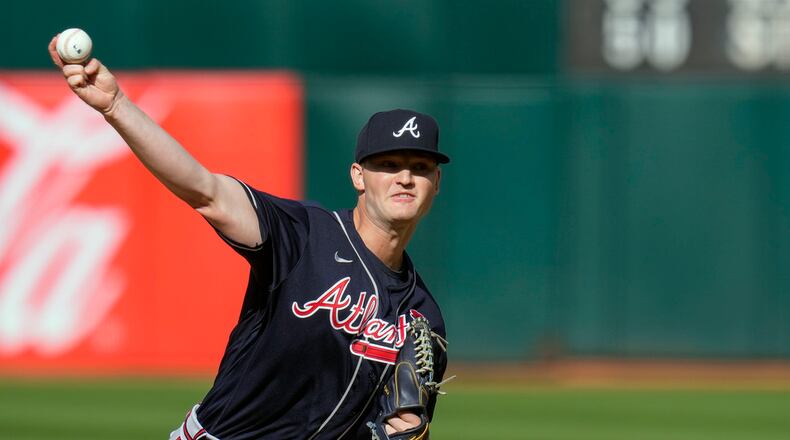Heading into the Oakland series that began Memorial Day, much anticipation surrounded Michael Soroka and his triumphant return to the major leagues after almost three years away. He had ruptured his Achilles tendon twice and had three surgeries to help repair the ligament. Finally, he returned.
A week later, a reminder for everyone arrived: This is a cruel business. It is not about fairy tales or feel-good stories.
It is about winning.
Thus, the Braves sent down Soroka.
“I mean, I think he still needs to get those reps down in Triple-A, and I think he (thinks he) does too,” Braves manager Brian Snitker said. “We just keep forgetting that that’s a long time to go between (MLB appearances), when you’re pitching regularly and then take two and a half years off. That’s kinda rough, and I think that letting him go back and work on things and square himself away, it’s gonna be good for him.”
With Soroka back at Triple-A Gwinnett, the focus turns to 20-year-old AJ Smith-Shawver, who will start Friday or Saturday against the Nationals. He was the next starting pitcher up if the Braves needed one.
The Braves actually considered Smith-Shawver for that Monday start in Oakland – which they gave to Soroka – but Smith-Shawver wouldn’t have been on full rest. His turn in the rotation would’ve come Tuesday. So when the Braves decided this week not to give Soroka another start, it made it an easy decision to hand the ball to the rookie.
Snitker said he talked to Braves president of baseball operations Alex Anthopoulos about the Soroka move. Anthopoulos told the manager that delivering the news to Soroka went well, and that Soroka was realistic about everything.
“(Soroka has) been around long enough in the short career that he’s had, that he kind of felt it, too, that it’d benefit him for doing that,” Snitker said of Soroka going to Triple-A.
While Soroka’s story is inspiring, the Braves are in win-now mode. At this point, they feel Smith-Shawver gives them the best chance to win.
Soroka made two starts for the Braves before they optioned him. In Oakland, he allowed four runs over six innings. In Phoenix on Sunday, he lasted only 3-2/3 frames and gave up five runs. He also walked four Diamondbacks and only struck out two. On 30 swings against Soroka’s pitches, the Diamondbacks whiffed only twice.
In that same game, Smith-Shawver pitched 2-1/3 hitless innings out of the bullpen in his MLB debut. He struck out three of the eight batters he faced. He issued one walk.
“He did a good job the other day, so it was good to get him in there finally,” Snitker said. “We knew getting him three ups (going to the mound three times), if we decided to make a move, that he wouldn’t be too far detached from starting.”
The Braves always felt they wouldn’t bring up Soroka until he could stay in the rotation. Nothing is for certain in baseball, but they seemed to hope to avoid the situation that occurred – optioning him after only two starts. They didn’t want to yo-yo him between Triple-A and the majors.
But they needed a starter for that series opener in Oakland. At that point, Soroka had put together consecutive good outings for Gwinnett. They decided to give him an opportunity.
Had he run with it, the Braves would’ve kept him in the rotation and Smith-Shawver in the bullpen. It seemed clear, however, that Soroka could use more time in Gwinnett as he works on things.
This is the big leagues, after all. The Braves are in first place. They have a team capable of making the postseason.
Asked Sunday if he himself remained mindful that he might need an adjustment period coming back to the majors, Soroka said: “Maybe as a process, but I mean, we’re back in the big leagues, now. It’s time to get outs. If it were still time to work on things, I wouldn’t be here yet. I think it’s time to go put up more zeroes and fill up the glove a little bit better. I think that’s one thing that made me who I was, was filling up the strike zone. That’s going to be No. 1 focus going forward for sure.”
Less than 24 hours later, the Braves optioned him.
Smith-Shawver is their next option. We’ll see how he does.
When the Braves sent Jared Shuster down after his first stint in the majors, Snitker told him something like this: “Once we get started here, this is survival. It’s just about the day-in, day-out grind of this thing.”
Smith-Shawver will be the ninth Braves pitcher, excluding relievers, to start a game this season.
“You just get used to doing what you have to do to survive today,” Snitker said. “It’s not ideal all the time. But it is part of the journey that we go on every year for six and a half months.”
About the Author
Keep Reading
The Latest
Featured


